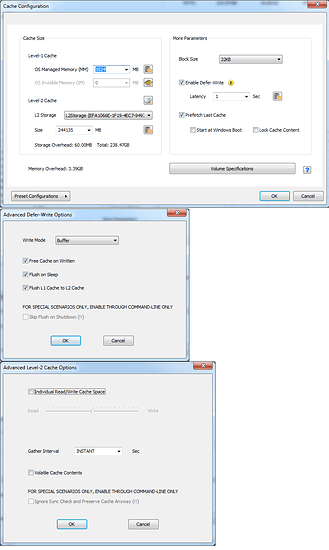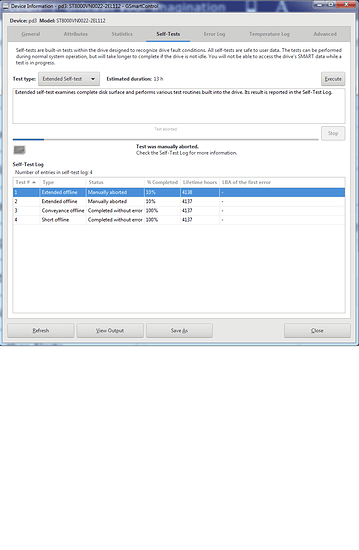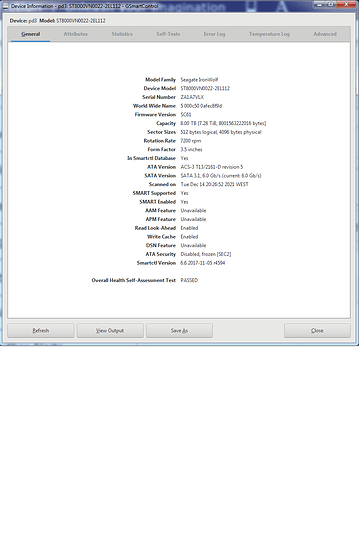Repository should be visible now, default settings had it set as private.
PS did not recognize the command
PS C:\Windows\system32> Get-PhysicalDisk | Select -Prop DeviceId,FriendlyName,SerialNumber
The term 'Get-PhysicalDisk' is not recognized as the name of a cmdlet, function, script file, or operable program. Chec
k the spelling of the name, or if a path was included, verify that the path is correct and try again.
At line:1 char:17
+ Get-PhysicalDisk <<<< | Select -Prop DeviceId,FriendlyName,SerialNumber
+ CategoryInfo : ObjectNotFound: (Get-PhysicalDisk:String) [], CommandNotFoundException
+ FullyQualifiedErrorId : CommandNotFoundException
Did you mean:
PS C:\Windows\system32> Get-PSDrive
Name Used (GB) Free (GB) Provider Root CurrentLocation
---- --------- --------- -------- ---- ---------------
Alias Alias
C 188,87 34,70 FileSystem C:\ Windows\system32
cert Certificate \
D FileSystem D:\
Env Environment
Function Function
HKCU Registry HKEY_CURRENT_USER
HKLM Registry HKEY_LOCAL_MACHINE
M 11022,89 11332,85 FileSystem M:\
Variable Variable
WSMan WSMan
I don’t have any other match for Get-P.*(disk|drive)
I have another command i ran before:
PS C:\Windows\system32> Get-WmiObject win32_diskDrive
Partitions : 1
DeviceID : \\.\PHYSICALDRIVE0
Model : KINGSTON SV300S37A240G SATA Disk Device
Size : 240054796800
Caption : KINGSTON SV300S37A240G SATA Disk Device
Partitions : 2
DeviceID : \\.\PHYSICALDRIVE1
Model : ST8000VN 0022-2EL112 SATA Disk Device
Size : 8001560609280
Caption : ST8000VN 0022-2EL112 SATA Disk Device
Partitions : 2
DeviceID : \\.\PHYSICALDRIVE3
Model : ST8000VN 0022-2EL112 SATA Disk Device
Size : 8001560609280
Caption : ST8000VN 0022-2EL112 SATA Disk Device
Partitions : 2
DeviceID : \\.\PHYSICALDRIVE4
Model : ST8000VN 0022-2EL112 SATA Disk Device
Size : 8001560609280
Caption : ST8000VN 0022-2EL112 SATA Disk Device
I don’t see any reports of bad blocks I see:
Events
NTFS E55 Note last message stopped after a chkdsk run.
Log Name: System
Source: Ntfs
Date: 2021-12-09 15:04:47
Event ID: 55
Task Category: (2)
Level: Error
Keywords: Classic
User: N/A
Computer: Orion-PC
Description:
The file system structure on the disk is corrupt and unusable. Please run the chkdsk utility on the volume Mass storage.
Event Xml:
<Event xmlns="http://schemas.microsoft.com/win/2004/08/events/event">
<System>
<Provider Name="Ntfs" />
<EventID Qualifiers="49156">55</EventID>
<Level>2</Level>
<Task>2</Task>
<Keywords>0x80000000000000</Keywords>
<TimeCreated SystemTime="2021-12-09T14:04:47.325513000Z" />
<EventRecordID>679163</EventRecordID>
<Channel>System</Channel>
<Computer>Orion-PC</Computer>
<Security />
</System>
<EventData>
<Data>
</Data>
<Data>Mass storage</Data>
<Binary>05000C000200380002000000370004C000000000020100C000000000000000000000000000000000BB00170089FB0C0000000800</Binary>
</EventData>
</Event>
AMD Sata Reset device E129
Log Name: System
Source: amd_sata
Date: 2021-12-13 14:11:58
Event ID: 129
Task Category: None
Level: Warning
Keywords: Classic
User: N/A
Computer: Orion-PC
Description:
Reset to device, \Device\RaidPort0, was issued.
Event Xml:
<Event xmlns="http://schemas.microsoft.com/win/2004/08/events/event">
<System>
<Provider Name="amd_sata" />
<EventID Qualifiers="32772">129</EventID>
<Level>3</Level>
<Task>0</Task>
<Keywords>0x80000000000000</Keywords>
<TimeCreated SystemTime="2021-12-13T13:11:58.294694800Z" />
<EventRecordID>700162</EventRecordID>
<Channel>System</Channel>
<Computer>Orion-PC</Computer>
<Security />
</System>
<EventData>
<Data>\Device\RaidPort0</Data>
<Binary>0F001800010000000000000081000480040000000000000000000000000000000000000000000000000000000000000002000000810004800000000000000000</Binary>
</EventData>
</Event>
And disk 2 not ready for access yet E15 last seen yesterday but no new events today.
Log Name: System
Source: Disk
Date: 2021-12-12 15:54:06
Event ID: 15
Task Category: None
Level: Error
Keywords: Classic
User: N/A
Computer: Orion-PC
Description:
The device, \Device\Harddisk2\DR2, is not ready for access yet.
Event Xml:
<Event xmlns="http://schemas.microsoft.com/win/2004/08/events/event">
<System>
<Provider Name="Disk" />
<EventID Qualifiers="49156">15</EventID>
<Level>2</Level>
<Task>0</Task>
<Keywords>0x80000000000000</Keywords>
<TimeCreated SystemTime="2021-12-12T14:54:06.297315600Z" />
<EventRecordID>699604</EventRecordID>
<Channel>System</Channel>
<Computer>Orion-PC</Computer>
<Security />
</System>
<EventData>
<Data>\Device\Harddisk2\DR2</Data>
<Binary>0300800001000000000000000F0004C0040100009D0000C000000000000000000000000000000000B0C0040000000000FFFFFFFF000000005800000A00020000EC200A1242032000000010003C0000000000300000000000681B191B80FAFFFF00000000000000006018191B80FAFFFF00000000000000008022081C0000000028001C08228000080000000000000000000000000000000000000000000000000000000000000000</Binary>
</EventData>
</Event>
I think Device #2 is a physical device as it shows up when i run
DISKPART> list disk
Disk ### Status Size Free Dyn Gpt
-------- ------------- ------- ------- --- ---
Disk 0 Online 223 GB 0 B
Disk 1 Online 7452 GB 0 B * *
Disk 2 Online 7452 GB 0 B * *
Disk 3 Online 7452 GB 0 B * *
DISKPART> exit
Leaving DiskPart...
C:\Windows\system32>wmic diskdrive get caption, deviceid, size
Caption DeviceID Size
KINGSTON SV300S37A240G SATA Disk Device \\.\PHYSICALDRIVE0 240054796800
ST8000VN 0022-2EL112 SATA Disk Device \\.\PHYSICALDRIVE1 8001560609280
ST8000VN 0022-2EL112 SATA Disk Device \\.\PHYSICALDRIVE2 8001560609280
ST8000VN 0022-2EL112 SATA Disk Device \\.\PHYSICALDRIVE3 8001560609280
The disk is accelerated by primocache
windows > primocache (ram cache > l2 ssd > windows software Raid 5 ( segate 8tb hdd, segate 8tb hdd, segate 8tb hdd ) )





